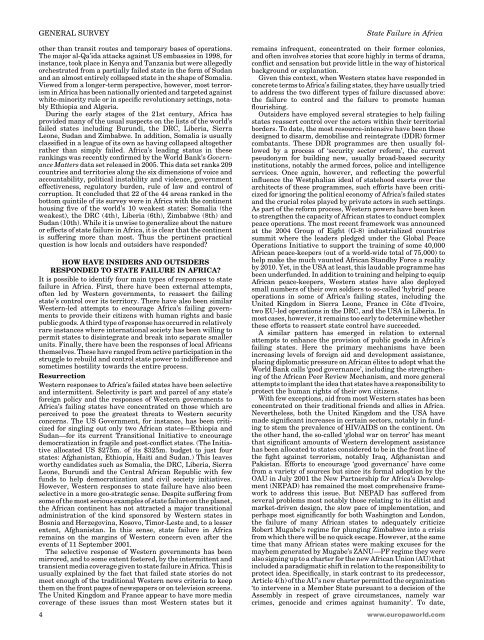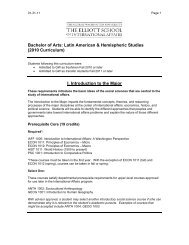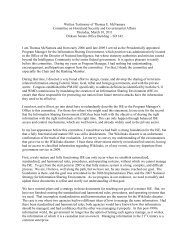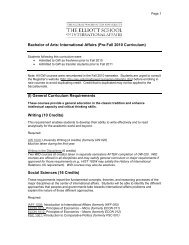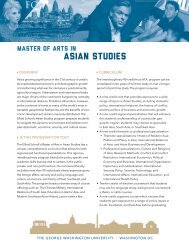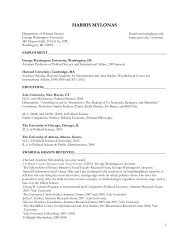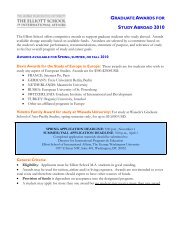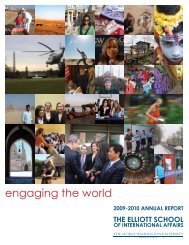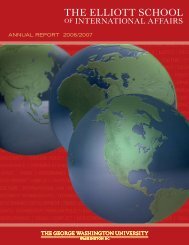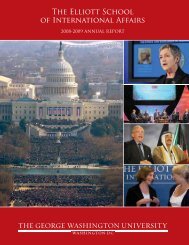state failure in africa: causes, consequences and responses
state failure in africa: causes, consequences and responses
state failure in africa: causes, consequences and responses
Create successful ePaper yourself
Turn your PDF publications into a flip-book with our unique Google optimized e-Paper software.
GENERAL SURVEY State Failure <strong>in</strong> Africa<br />
other than transit routes <strong>and</strong> temporary bases of operations.<br />
The major al-Qa’ida attacks aga<strong>in</strong>st US embassies <strong>in</strong> 1998, for<br />
<strong>in</strong>stance, took place <strong>in</strong> Kenya <strong>and</strong> Tanzania but were allegedly<br />
orchestrated from a partially failed <strong>state</strong> <strong>in</strong> the form of Sudan<br />
<strong>and</strong> an almost entirely collapsed <strong>state</strong> <strong>in</strong> the shape of Somalia.<br />
Viewed from a longer-term perspective, however, most terrorism<br />
<strong>in</strong> Africa has been nationally oriented <strong>and</strong> targeted aga<strong>in</strong>st<br />
white-m<strong>in</strong>ority rule or <strong>in</strong> specific revolutionary sett<strong>in</strong>gs, notably<br />
Ethiopia <strong>and</strong> Algeria.<br />
Dur<strong>in</strong>g the early stages of the 21st century, Africa has<br />
provided many of the usual suspects on the lists of the world’s<br />
failed <strong>state</strong>s <strong>in</strong>clud<strong>in</strong>g Burundi, the DRC, Liberia, Sierra<br />
Leone, Sudan <strong>and</strong> Zimbabwe. In addition, Somalia is usually<br />
classified <strong>in</strong> a league of its own as hav<strong>in</strong>g collapsed altogether<br />
rather than simply failed. Africa’s lead<strong>in</strong>g status <strong>in</strong> these<br />
rank<strong>in</strong>gs was recently confirmed by the World Bank’s Governance<br />
Matters data set released <strong>in</strong> 2005. This data set ranks 209<br />
countries <strong>and</strong> territories along the six dimensions of voice <strong>and</strong><br />
accountability, political <strong>in</strong>stability <strong>and</strong> violence, government<br />
effectiveness, regulatory burden, rule of law <strong>and</strong> control of<br />
corruption. It concluded that 22 of the 44 areas ranked <strong>in</strong> the<br />
bottom qu<strong>in</strong>tile of its survey were <strong>in</strong> Africa with the cont<strong>in</strong>ent<br />
hous<strong>in</strong>g five of the world’s 10 weakest <strong>state</strong>s: Somalia (the<br />
weakest), the DRC (4th), Liberia (6th), Zimbabwe (8th) <strong>and</strong><br />
Sudan (10th). While it is unwise to generalize about the nature<br />
or effects of <strong>state</strong> <strong>failure</strong> <strong>in</strong> Africa, it is clear that the cont<strong>in</strong>ent<br />
is suffer<strong>in</strong>g more than most. Thus the pert<strong>in</strong>ent practical<br />
question is how locals <strong>and</strong> outsiders have responded?<br />
HOW HAVE INSIDERS AND OUTSIDERS<br />
RESPONDED TO STATE FAILURE IN AFRICA?<br />
It is possible to identify four ma<strong>in</strong> types of <strong>responses</strong> to <strong>state</strong><br />
<strong>failure</strong> <strong>in</strong> Africa. First, there have been external attempts,<br />
often led by Western governments, to reassert the fail<strong>in</strong>g<br />
<strong>state</strong>’s control over its territory. There have also been similar<br />
Western-led attempts to encourage Africa’s fail<strong>in</strong>g governments<br />
to provide their citizens with human rights <strong>and</strong> basic<br />
public goods. A third type of response has occurred <strong>in</strong> relatively<br />
rare <strong>in</strong>stances where <strong>in</strong>ternational society has been will<strong>in</strong>g to<br />
permit <strong>state</strong>s to dis<strong>in</strong>tegrate <strong>and</strong> break <strong>in</strong>to separate smaller<br />
units. F<strong>in</strong>ally, there have been the <strong>responses</strong> of local Africans<br />
themselves. These have ranged from active participation <strong>in</strong> the<br />
struggle to rebuild <strong>and</strong> control <strong>state</strong> power to <strong>in</strong>difference <strong>and</strong><br />
sometimes hostility towards the entire process.<br />
Resurrection<br />
Western <strong>responses</strong> to Africa’s failed <strong>state</strong>s have been selective<br />
<strong>and</strong> <strong>in</strong>termittent. Selectivity is part <strong>and</strong> parcel of any <strong>state</strong>’s<br />
foreign policy <strong>and</strong> the <strong>responses</strong> of Western governments to<br />
Africa’s fail<strong>in</strong>g <strong>state</strong>s have concentrated on those which are<br />
perceived to pose the greatest threats to Western security<br />
concerns. The US Government, for <strong>in</strong>stance, has been criticized<br />
for s<strong>in</strong>gl<strong>in</strong>g out only two African <strong>state</strong>s—Ethiopia <strong>and</strong><br />
Sudan—for its current Transitional Initiative to encourage<br />
democratization <strong>in</strong> fragile <strong>and</strong> post-conflict <strong>state</strong>s. (The Initiative<br />
allocated US $275m. of its $325m. budget to just four<br />
<strong>state</strong>s: Afghanistan, Ethiopia, Haiti <strong>and</strong> Sudan.) This leaves<br />
worthy c<strong>and</strong>idates such as Somalia, the DRC, Liberia, Sierra<br />
Leone, Burundi <strong>and</strong> the Central African Republic with few<br />
funds to help democratization <strong>and</strong> civil society <strong>in</strong>itiatives.<br />
However, Western <strong>responses</strong> to <strong>state</strong> <strong>failure</strong> have also been<br />
selective <strong>in</strong> a more geo-strategic sense. Despite suffer<strong>in</strong>g from<br />
some of the most serious examples of <strong>state</strong> <strong>failure</strong> on the planet,<br />
the African cont<strong>in</strong>ent has not attracted a major transitional<br />
adm<strong>in</strong>istration of the k<strong>in</strong>d sponsored by Western <strong>state</strong>s <strong>in</strong><br />
Bosnia <strong>and</strong> Herzegov<strong>in</strong>a, Kosovo, Timor-Leste <strong>and</strong>, to a lesser<br />
extent, Afghanistan. In this sense, <strong>state</strong> <strong>failure</strong> <strong>in</strong> Africa<br />
rema<strong>in</strong>s on the marg<strong>in</strong>s of Western concern even after the<br />
events of 11 September 2001.<br />
The selective response of Western governments has been<br />
mirrored, <strong>and</strong> to some extent fostered, by the <strong>in</strong>termittent <strong>and</strong><br />
transient media coverage given to <strong>state</strong> <strong>failure</strong> <strong>in</strong> Africa. This is<br />
usually expla<strong>in</strong>ed by the fact that failed <strong>state</strong> stories do not<br />
meet enough of the traditional Western news criteria to keep<br />
them on the front pages of newspapers or on television screens.<br />
The United K<strong>in</strong>gdom <strong>and</strong> France appear to have more media<br />
coverage of these issues than most Western <strong>state</strong>s but it<br />
rema<strong>in</strong>s <strong>in</strong>frequent, concentrated on their former colonies,<br />
<strong>and</strong> often <strong>in</strong>volves stories that score highly <strong>in</strong> terms of drama,<br />
conflict <strong>and</strong> sensation but provide little <strong>in</strong> the way of historical<br />
background or explanation.<br />
Given this context, when Western <strong>state</strong>s have responded <strong>in</strong><br />
concrete terms to Africa’s fail<strong>in</strong>g <strong>state</strong>s, they have usually tried<br />
to address the two different types of <strong>failure</strong> discussed above:<br />
the <strong>failure</strong> to control <strong>and</strong> the <strong>failure</strong> to promote human<br />
flourish<strong>in</strong>g.<br />
Outsiders have employed several strategies to help fail<strong>in</strong>g<br />
<strong>state</strong>s reassert control over the actors with<strong>in</strong> their territorial<br />
borders. To date, the most resource-<strong>in</strong>tensive have been those<br />
designed to disarm, demobilise <strong>and</strong> re<strong>in</strong>tegrate (DDR) former<br />
combatants. These DDR programmes are then usually followed<br />
by a process of ‘security sector reform’, the current<br />
pseudonym for build<strong>in</strong>g new, usually broad-based security<br />
<strong>in</strong>stitutions, notably the armed forces, police <strong>and</strong> <strong>in</strong>telligence<br />
services. Once aga<strong>in</strong>, however, <strong>and</strong> reflect<strong>in</strong>g the powerful<br />
<strong>in</strong>fluence the Westphalian ideal of <strong>state</strong>hood exerts over the<br />
architects of these programmes, such efforts have been criticized<br />
for ignor<strong>in</strong>g the political economy of Africa’s failed <strong>state</strong>s<br />
<strong>and</strong> the crucial roles played by private actors <strong>in</strong> such sett<strong>in</strong>gs.<br />
As part of the reform process, Western powers have been keen<br />
to strengthen the capacity of African <strong>state</strong>s to conduct complex<br />
peace operations. The most recent framework was announced<br />
at the 2004 Group of Eight (G-8) <strong>in</strong>dustrialized countries<br />
summit where the leaders pledged under the Global Peace<br />
Operations Initiative to support the tra<strong>in</strong><strong>in</strong>g of some 40,000<br />
African peace-keepers (out of a world-wide total of 75,000) to<br />
help make the much vaunted African St<strong>and</strong>by Force a reality<br />
by 2010. Yet, <strong>in</strong> the USA at least, this laudable programme has<br />
been underfunded. In addition to tra<strong>in</strong><strong>in</strong>g <strong>and</strong> help<strong>in</strong>g to equip<br />
African peace-keepers, Western <strong>state</strong>s have also deployed<br />
small numbers of their own soldiers to so-called ‘hybrid’ peace<br />
operations <strong>in</strong> some of Africa’s fail<strong>in</strong>g <strong>state</strong>s, <strong>in</strong>clud<strong>in</strong>g the<br />
United K<strong>in</strong>gdom <strong>in</strong> Sierra Leone, France <strong>in</strong> Côte d’Ivoire,<br />
two EU-led operations <strong>in</strong> the DRC, <strong>and</strong> the USA <strong>in</strong> Liberia. In<br />
most cases, however, it rema<strong>in</strong>s too early to determ<strong>in</strong>e whether<br />
these efforts to reassert <strong>state</strong> control have succeeded.<br />
A similar pattern has emerged <strong>in</strong> relation to external<br />
attempts to enhance the provision of public goods <strong>in</strong> Africa’s<br />
fail<strong>in</strong>g <strong>state</strong>s. Here the primary mechanisms have been<br />
<strong>in</strong>creas<strong>in</strong>g levels of foreign aid <strong>and</strong> development assistance,<br />
plac<strong>in</strong>g diplomatic pressure on African élites to adopt what the<br />
World Bank calls ‘good governance’, <strong>in</strong>clud<strong>in</strong>g the strengthen<strong>in</strong>g<br />
of the African Peer Review Mechanism, <strong>and</strong> more general<br />
attempts to implant the idea that <strong>state</strong>s have a responsibility to<br />
protect the human rights of their own citizens.<br />
With few exceptions, aid from most Western <strong>state</strong>s has been<br />
concentrated on their traditional friends <strong>and</strong> allies <strong>in</strong> Africa.<br />
Nevertheless, both the United K<strong>in</strong>gdom <strong>and</strong> the USA have<br />
made significant <strong>in</strong>creases <strong>in</strong> certa<strong>in</strong> sectors, notably <strong>in</strong> fund<strong>in</strong>g<br />
to stem the prevalence of HIV/AIDS on the cont<strong>in</strong>ent. On<br />
the other h<strong>and</strong>, the so-called ‘global war on terror’ has meant<br />
that significant amounts of Western development assistance<br />
has been allocated to <strong>state</strong>s considered to be <strong>in</strong> the front l<strong>in</strong>e of<br />
the fight aga<strong>in</strong>st terrorism, notably Iraq, Afghanistan <strong>and</strong><br />
Pakistan. Efforts to encourage ‘good governance’ have come<br />
from a variety of sources but s<strong>in</strong>ce its formal adoption by the<br />
OAU <strong>in</strong> July 2001 the New Partnership for Africa’s Development<br />
(NEPAD) has rema<strong>in</strong>ed the most comprehensive framework<br />
to address this issue. But NEPAD has suffered from<br />
several problems most notably those relat<strong>in</strong>g to its élitist <strong>and</strong><br />
market-driven design, the slow pace of implementation, <strong>and</strong><br />
perhaps most significantly for both Wash<strong>in</strong>gton <strong>and</strong> London,<br />
the <strong>failure</strong> of many African <strong>state</strong>s to adequately criticize<br />
Robert Mugabe’s regime for plung<strong>in</strong>g Zimbabwe <strong>in</strong>to a crisis<br />
from which there will be no quick escape. However, at the same<br />
time that many African <strong>state</strong>s were mak<strong>in</strong>g excuses for the<br />
mayhem generated by Mugabe’s ZANU—PF regime they were<br />
also sign<strong>in</strong>g up to a charter for the new African Union (AU) that<br />
<strong>in</strong>cluded a paradigmatic shift <strong>in</strong> relation to the responsibility to<br />
protect idea. Specifically, <strong>in</strong> stark contrast to its predecessor,<br />
Article 4(h) of the AU’s new charter permitted the organization<br />
‘to <strong>in</strong>tervene <strong>in</strong> a Member State pursuant to a decision of the<br />
Assembly <strong>in</strong> respect of grave circumstances, namely war<br />
crimes, genocide <strong>and</strong> crimes aga<strong>in</strong>st humanity’. To date,<br />
4 www.europaworld.com


